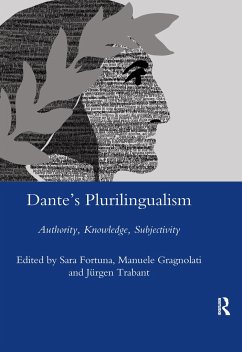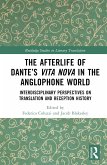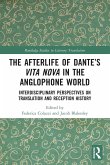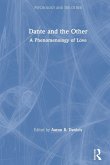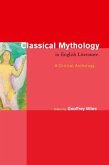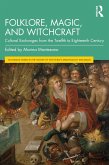- Broschiertes Buch
- Merkliste
- Auf die Merkliste
- Bewerten Bewerten
- Teilen
- Produkt teilen
- Produkterinnerung
- Produkterinnerung
This book focuses on Dante's central problem of the plurality of languages. It discusses the medieval theories of language and explores Dante's original place with respect to them by focusing on the concepts of universality, unity, variability and plurality.
Andere Kunden interessierten sich auch für
![The Afterlife of Dante's Vita Nova in the Anglophone World The Afterlife of Dante's Vita Nova in the Anglophone World]() The Afterlife of Dante's Vita Nova in the Anglophone World148,99 €
The Afterlife of Dante's Vita Nova in the Anglophone World148,99 €![The Afterlife of Dante's Vita Nova in the Anglophone World The Afterlife of Dante's Vita Nova in the Anglophone World]() The Afterlife of Dante's Vita Nova in the Anglophone World44,99 €
The Afterlife of Dante's Vita Nova in the Anglophone World44,99 €![English and Italian Literature From Dante to Shakespeare English and Italian Literature From Dante to Shakespeare]() Robin KirkpatrickEnglish and Italian Literature From Dante to Shakespeare65,99 €
Robin KirkpatrickEnglish and Italian Literature From Dante to Shakespeare65,99 €![Dante and the Other Dante and the Other]() Dante and the Other37,99 €
Dante and the Other37,99 €![Intersections of Religion and Astronomy Intersections of Religion and Astronomy]() Intersections of Religion and Astronomy44,99 €
Intersections of Religion and Astronomy44,99 €![Classical Mythology in English Literature Classical Mythology in English Literature]() Miles Geoffrey (ed.)Classical Mythology in English Literature70,99 €
Miles Geoffrey (ed.)Classical Mythology in English Literature70,99 €![Folklore, Magic, and Witchcraft Folklore, Magic, and Witchcraft]() Folklore, Magic, and Witchcraft41,99 €
Folklore, Magic, and Witchcraft41,99 €-
-
-
This book focuses on Dante's central problem of the plurality of languages. It discusses the medieval theories of language and explores Dante's original place with respect to them by focusing on the concepts of universality, unity, variability and plurality.
Hinweis: Dieser Artikel kann nur an eine deutsche Lieferadresse ausgeliefert werden.
Hinweis: Dieser Artikel kann nur an eine deutsche Lieferadresse ausgeliefert werden.
Produktdetails
- Produktdetails
- Verlag: Taylor & Francis Ltd
- Seitenzahl: 308
- Erscheinungstermin: 30. Juni 2020
- Englisch
- Abmessung: 169mm x 246mm x 20mm
- Gewicht: 544g
- ISBN-13: 9780367602444
- ISBN-10: 036760244X
- Artikelnr.: 70031192
- Herstellerkennzeichnung
- Libri GmbH
- Europaallee 1
- 36244 Bad Hersfeld
- gpsr@libri.de
- Verlag: Taylor & Francis Ltd
- Seitenzahl: 308
- Erscheinungstermin: 30. Juni 2020
- Englisch
- Abmessung: 169mm x 246mm x 20mm
- Gewicht: 544g
- ISBN-13: 9780367602444
- ISBN-10: 036760244X
- Artikelnr.: 70031192
- Herstellerkennzeichnung
- Libri GmbH
- Europaallee 1
- 36244 Bad Hersfeld
- gpsr@libri.de
Sara Fortuna
Introduction: Dante's Plurilingualism Part I: Theories 1. Mother Tongues in
the Middle Ages and Dante 2. Millena variatio: Overcoming the Horror of
Variation 3. Man as a Speaking and Political Animal: A Political Reading of
Dante's De vulgari eloquentia 4. Volgare e latino nella storia di Dante 5.
Le idee linguistiche di Dante e il naturalismo fiorentino-toscano del
Cinquecento 6. Aristotele e Dante, filosofi della variabilità linguistica
Part II: Authority 7. The Roots of Dante's Plurilingualism: 'Hybridity' and
Language in the Vita nova 8. Language as a Mirror of the Soul: Guilt and
Punishment in Dante's Concept of Language 9. Plurilingualism sub specie
aeternitatis and the Strategies of a Minority Author Part III: Subjectivity
10. Dante's Blind Spot (Inferno XVI-XVII) 11. Trasmutabile per tutte
guise': Dante in the Comedy 12. Is Ulysses Queer? The Subject of Greek Love
in Inferno XV and XXVI 13. Lost for Words: Recuperating Melancholy
Subjectivity in Dante's Eden 14. (In-)Corporeality, Language, Performance
in Dante's Vita Nuova and Commedia 15. Dante After Wittgenstein: 'Aspetto',
Language, and Subjectivity from Convivio to Paradiso
the Middle Ages and Dante 2. Millena variatio: Overcoming the Horror of
Variation 3. Man as a Speaking and Political Animal: A Political Reading of
Dante's De vulgari eloquentia 4. Volgare e latino nella storia di Dante 5.
Le idee linguistiche di Dante e il naturalismo fiorentino-toscano del
Cinquecento 6. Aristotele e Dante, filosofi della variabilità linguistica
Part II: Authority 7. The Roots of Dante's Plurilingualism: 'Hybridity' and
Language in the Vita nova 8. Language as a Mirror of the Soul: Guilt and
Punishment in Dante's Concept of Language 9. Plurilingualism sub specie
aeternitatis and the Strategies of a Minority Author Part III: Subjectivity
10. Dante's Blind Spot (Inferno XVI-XVII) 11. Trasmutabile per tutte
guise': Dante in the Comedy 12. Is Ulysses Queer? The Subject of Greek Love
in Inferno XV and XXVI 13. Lost for Words: Recuperating Melancholy
Subjectivity in Dante's Eden 14. (In-)Corporeality, Language, Performance
in Dante's Vita Nuova and Commedia 15. Dante After Wittgenstein: 'Aspetto',
Language, and Subjectivity from Convivio to Paradiso
Introduction: Dante's Plurilingualism Part I: Theories 1. Mother Tongues in the Middle Ages and Dante 2. Millena variatio: Overcoming the Horror of Variation 3. Man as a Speaking and Political Animal: A Political Reading of Dante's De vulgari eloquentia 4. Volgare e latino nella storia di Dante 5. Le idee linguistiche di Dante e il naturalismo fiorentino-toscano del Cinquecento 6. Aristotele e Dante, filosofi della variabilità linguistica Part II: Authority 7. The Roots of Dante's Plurilingualism: 'Hybridity' and Language in the Vita nova 8. Language as a Mirror of the Soul: Guilt and Punishment in Dante's Concept of Language 9. Plurilingualism sub specie aeternitatis and the Strategies of a Minority Author Part III: Subjectivity 10. Dante's Blind Spot (Inferno XVI-XVII) 11. Trasmutabile per tutte guise': Dante in the Comedy 12. Is Ulysses Queer? The Subject of Greek Love in Inferno XV and XXVI 13. Lost for Words: Recuperating Melancholy Subjectivity in Dante's Eden 14. (In-)Corporeality, Language, Performance in Dante's Vita Nuova and Commedia 15. Dante After Wittgenstein: 'Aspetto', Language, and Subjectivity from Convivio to Paradiso
Introduction: Dante's Plurilingualism Part I: Theories 1. Mother Tongues in
the Middle Ages and Dante 2. Millena variatio: Overcoming the Horror of
Variation 3. Man as a Speaking and Political Animal: A Political Reading of
Dante's De vulgari eloquentia 4. Volgare e latino nella storia di Dante 5.
Le idee linguistiche di Dante e il naturalismo fiorentino-toscano del
Cinquecento 6. Aristotele e Dante, filosofi della variabilità linguistica
Part II: Authority 7. The Roots of Dante's Plurilingualism: 'Hybridity' and
Language in the Vita nova 8. Language as a Mirror of the Soul: Guilt and
Punishment in Dante's Concept of Language 9. Plurilingualism sub specie
aeternitatis and the Strategies of a Minority Author Part III: Subjectivity
10. Dante's Blind Spot (Inferno XVI-XVII) 11. Trasmutabile per tutte
guise': Dante in the Comedy 12. Is Ulysses Queer? The Subject of Greek Love
in Inferno XV and XXVI 13. Lost for Words: Recuperating Melancholy
Subjectivity in Dante's Eden 14. (In-)Corporeality, Language, Performance
in Dante's Vita Nuova and Commedia 15. Dante After Wittgenstein: 'Aspetto',
Language, and Subjectivity from Convivio to Paradiso
the Middle Ages and Dante 2. Millena variatio: Overcoming the Horror of
Variation 3. Man as a Speaking and Political Animal: A Political Reading of
Dante's De vulgari eloquentia 4. Volgare e latino nella storia di Dante 5.
Le idee linguistiche di Dante e il naturalismo fiorentino-toscano del
Cinquecento 6. Aristotele e Dante, filosofi della variabilità linguistica
Part II: Authority 7. The Roots of Dante's Plurilingualism: 'Hybridity' and
Language in the Vita nova 8. Language as a Mirror of the Soul: Guilt and
Punishment in Dante's Concept of Language 9. Plurilingualism sub specie
aeternitatis and the Strategies of a Minority Author Part III: Subjectivity
10. Dante's Blind Spot (Inferno XVI-XVII) 11. Trasmutabile per tutte
guise': Dante in the Comedy 12. Is Ulysses Queer? The Subject of Greek Love
in Inferno XV and XXVI 13. Lost for Words: Recuperating Melancholy
Subjectivity in Dante's Eden 14. (In-)Corporeality, Language, Performance
in Dante's Vita Nuova and Commedia 15. Dante After Wittgenstein: 'Aspetto',
Language, and Subjectivity from Convivio to Paradiso
Introduction: Dante's Plurilingualism Part I: Theories 1. Mother Tongues in the Middle Ages and Dante 2. Millena variatio: Overcoming the Horror of Variation 3. Man as a Speaking and Political Animal: A Political Reading of Dante's De vulgari eloquentia 4. Volgare e latino nella storia di Dante 5. Le idee linguistiche di Dante e il naturalismo fiorentino-toscano del Cinquecento 6. Aristotele e Dante, filosofi della variabilità linguistica Part II: Authority 7. The Roots of Dante's Plurilingualism: 'Hybridity' and Language in the Vita nova 8. Language as a Mirror of the Soul: Guilt and Punishment in Dante's Concept of Language 9. Plurilingualism sub specie aeternitatis and the Strategies of a Minority Author Part III: Subjectivity 10. Dante's Blind Spot (Inferno XVI-XVII) 11. Trasmutabile per tutte guise': Dante in the Comedy 12. Is Ulysses Queer? The Subject of Greek Love in Inferno XV and XXVI 13. Lost for Words: Recuperating Melancholy Subjectivity in Dante's Eden 14. (In-)Corporeality, Language, Performance in Dante's Vita Nuova and Commedia 15. Dante After Wittgenstein: 'Aspetto', Language, and Subjectivity from Convivio to Paradiso

